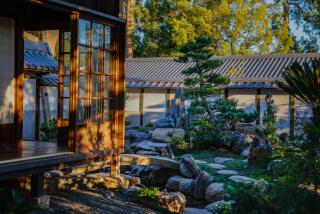Keeping the Faith
From an unremarkable house on a quiet street in Fountain Valley comes the faint sound of finger bells and chanting. Hiro Hosokawa is leading his family in the monthly Tenri service.
Hiro’s two brothers-in-law have come with their families from Los Angeles. Wearing black jackets or kimonos, they kneel before a wooden shrine and pray, then perform a slow, ritual dance accompanied by finger bells, wooden clappers and chanting. Their motions mimic plowing a field and planting a crop, reflections of Tenri’s emphasis on the value of labor. The dance consumes most of the hourlong service.
As it closes, Hosokawa reads a passage from a Tenri devotional, reminding everyone to rid his mind of impure thoughts and to work hard. Then comes the fruit of hard work, the feast--bowls of sake, leeks, tuna, bananas, sushi and steamed rice.
Formally known as Tenrikyo (translation: Religion of Divine Wisdom) the faith with roots in mid-19th century Japan espouses a happy life free from diseases and suffering. It has only about 3,000 members in all of North America. With no more than a handful of members nearby, families such as the Hosokawas must hold their own services at home.
That makes it hard to keep Tenri traditions alive here, says the Rev. Hinao Nagao of the Tenri church in the Boyle Heights neighborhood adjacent to Little Tokyo in Los Angeles. He oversees Tenri in the United States and Canada. “Here people don’t give you group support,” he says.
To bolster faith, Nagao encourages every member to visit the jiba. It is a sacred recess in Tenri city’s main temple, where the world is believed to have been created and from which salvation will eventually extend worldwide. Noting that the spirit of Tenri’s founder is thought to dwell there, the reverend says the pilgrimage is especially important for Japanese American children, because it strengthens their sense of ethnic roots and religion.
Hosokawa’s 23-year-old daughter, Nachi, studied the religion and the Japanese language in Tenri for two years as part of a church-sponsored program.
Masa Norimoto, one of Hosokawa’s brothers-in-law, says he is not worried by his 3-year-old daughter attending a Catholic nursery school. Her faith “doesn’t have to be in Jesus Christ or Tenri or Buddha now, as long as she appreciates God,” he says.
But he hopes that when she and her 11-year-old brother mature they, too, will follow Tenri. “I don’t tell them they have to believe in Tenri, but I take them to church, and they can decide from there.”
More to Read
Sign up for Essential California
The most important California stories and recommendations in your inbox every morning.
You may occasionally receive promotional content from the Los Angeles Times.










